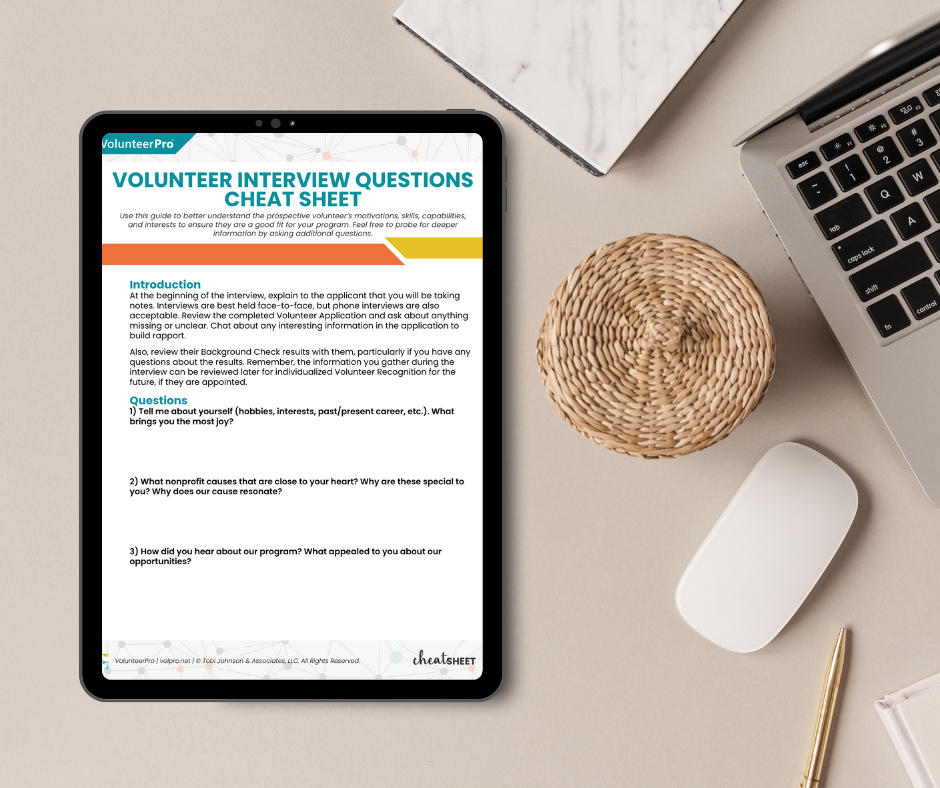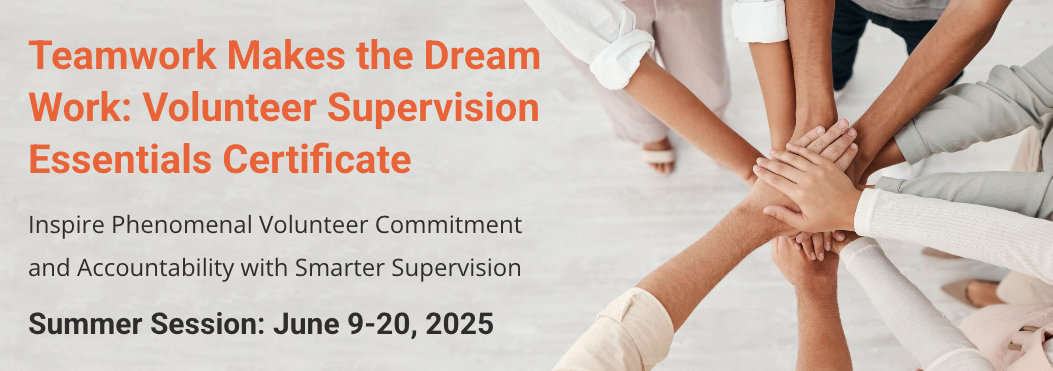16 Wise Questions to Ask Volunteers to Encourage Deep Commitment
Throughout the recruitment and screening process, there are helpful questions to ask volunteers that can both decide whether a volunteer is a good match and set them up for a successful experience.
The questions to ask volunteers listed below can be asked at outreach events, on applications, in interviews, during informational sessions, in social media, and anywhere you are speaking with volunteers about your opportunities.
They can be used to break the ice, assess suitability, or get to know the volunteer better. They are also helpful in determining if a volunteer has the realistic capacity to follow through and if they are ready and willing to learn new things – all minimum requirements for a new volunteer to be successful and enjoy their role to the fullest.
When you take the time up front to understand if your organization and role are good fits for the volunteer and if the volunteer’s needs and expectations are a good fit for you, then you can reduce wasted time for everyone. You can reduce the amount of time spent on onboarding volunteers who won’t stick and dedicate your time and energy on supporting volunteers who are most likely to stay.
16 Questions to Ask Volunteers to Determine Suitability and a Great Match
Use this list of questions to ask volunteers to reduce early turnover by exploring all the things that might get in the way of true commitment.
-
What are the Causes They Feel Passionately About?
Volunteers who feel a close emotional connection to the organization’s mission are more likely to become deeply engaged and stay. So, listen carefully to their answer.
These questions to ask volunteers are super helpful in finding a mission fit. If they don’t mention anything that closely resembles your mission, you may want to consider helping them find a better match elsewhere.
-
What are Their “Must Have’s” and “Non-Negotiables”?
There is nothing more frustrating than being asked to do something you’ve specifically said makes you uncomfortable or that you don’t have time for.
Volunteers are not being paid and are not a temporary workforce. They are partners in actualizing your mission and, therefore, get to have a say in what they are assigned.
Make sure you know your volunteers’ taboos up front. It doesn’t mean they won’t evolve over time but start with what excites them. Also, be honest about any training requirements and whether they can meet these.
For more on desini8ng programs volunteers will love, check out 5 Key Factors in Creating a Program That Will Attract Volunteers HERE >>
-
What Brings Them the Most Joy?
This conversation will likely shed some light on what motivated them to apply in the first place and will give you some ideas about how to thank them for their service.
Keep those notes — you’ll need them later when you’re planning your volunteer recognition activities.
-
How Would They Like to Make a Difference?
If a volunteer seems like a good match, help them find a way to contribute, no matter how large or small, if you can support them and they are doing something that contributes to mission achievement.
Creating “busy work” or inconsequential tasks doesn’t help you and doing irrelevant work doesn’t feel great for volunteers who genuinely want to make a difference.
-
What Skills Do They Have (and want) to Share?
Try to design your volunteer engagement around a broad range of activities, from “menial” to highly skilled. By doing so, you will increase the opportunities for attracting volunteers, of all skill levels, to support your organization.
Also, don’t assume that just because someone has a skill, they want to put it to use. For example, an executive who manages stressful corporate mergers all week long may not be interested in developing partnerships for your organization. They may be more interested in something straightforward and relaxing, like doing data entry. Honor that.
For more on this, check out 3 Things You Need to Learn from Volunteer Screening Interviews HERE >>
-
What is Their Pet Peeve When It Comes to Past Volunteer Experiences?
This question gauges a volunteer’s ability to speak with diplomacy and tact about a poor experience as a volunteer (and haven’t we all had them?). Listen to the ways they handled the problem. Also, as the interviewer, you also get a chance to better understand the needs of this volunteer and get a sense of the trending needs and expectations of all volunteers if you take the time to keep track of these comments.
It goes without saying that if their pet peeve is something that goes on at your agency that you don’t see changing anytime soon, then the ethical move would be to let them know now, before they make a commitment they might regret. Yes, admit that you’re not the best place for them; they will thank you and respect you, too.
-
Have They Met Your Minimum Qualifications?
Establish your core requirements for specific volunteer positions, and don’t be shy about communicating them. If a volunteer doesn’t meet the minimum qualifications and can’t learn them easily, they will get frustrated and leave.
So, don’t be afraid or apologetic when asking about minimum computer skills, background checks, or anything else that is a go/no go for volunteers. It’s better to be up front and transparent, so you aren’t wasting their time or yours.
-
How Will They Incorporate Volunteering Into their Current Schedule?
You will want to explore what days of the week and times they are available and what frequency of volunteering makes sense in their world. Does once a month or weekly sound more doable in their world?
Often organizations assume volunteers will willingly bend to accommodate the organization’s need. Sometimes that is the cause. But more often, today’s busy volunteers are juggling several responsibilities and yet they still want to give back.
-
What Might Get in The Way of Following Through on Their Volunteer Commitments?
Instead of asking a Yes/No question – Would anything get in the way of your volunteer commitments? – ask them to ponder a little. However, just because they mention that something MIGHT get in the way, don’t assume it WILL get in the way. They may just be being honest. Respect that.
To better figure out the level of this barrier, follow up this question with – How would you manage that challenge if it came up? Then, look for a proactive, thoughtful plan in their response.
-
When Would Be the Best Time to Get Started?
You’ll need to know when a prospective volunteer has enough time to get started and can fully commit the time needed for their new volunteer schedule. This includes any time they need to set aside for training and orientation.
Sometimes it takes busy people a few weeks or even a month to clear the decks to accommodate a new commitment. So, give them some flexibility, but don’t wait too long. You don’t want them to forget the commitment they’ve made to your nonprofit!
-
Would They Be Open to Working with a Buddy or Team?
Consider matching volunteers with a buddy for job sharing, to lessen the load. As a team, they handle the task or role, and they decide together how and when it gets done and by whom.
But don’t assume that a volunteer is looking for social time. Sometimes introverted volunteers – or those that have limited time to give and want to be as efficient as possible – would be just as happy working on a solo project.
For more on how to support volunteer teams, check out Volunteer Nation Episode #018: How to Use Slack to Strengthen Volunteer Teams HERE >>
-
What Would They Do If They Had to Miss a Volunteer Shift?
By asking volunteers to respond to questions about common situations that occur at your nonprofit (also called behavior-based interviewing), you will have the opportunity to understand how each volunteer works, plans, problem solves and reacts to stress.
This is essential information to decide whether they are a suitable fit and, if so, what support they might need when they join the organization’s volunteer corps.
-
If They’ve Volunteered Before, How Would Their Fellow Volunteers (or Supervisors) Describe Them?
By asking volunteers to share how others perceive them, you get a small glimpse into their personality traits and strengths. You might also hear clues of possible red flags about their level of follow through.
Don’t be afraid to ask follow-up questions that dig into what they’re describing. You can ask people to elaborate by simply saying, “Tell me more about that.”
-
Can They Give You an Example of a Time When They Volunteered or Helped Someone Different Than Themselves? What Did They Learn from the Experience?
Diversity, equity, inclusion, belonging, and justice are all important parts of our work as nonprofits. And you want to make sure volunteers are ready and willing to take on that mandate and grow their cultural competency.
In answers to questions like these, you’re not looking for volunteers who know the catchphrases and insider speak. You’re looking for people who are willing to be vulnerable, admit mistakes (because everyone makes them when it comes to being inclusive), and are willing to learn and grow.
-
What’s One Thing on Their Lifetime Bucket List? Or, What’s One New Thing They Want to Learn?
People with a growth mindset are some of the best volunteers because they are up for anything.
Also, these are great questions to ask volunteers because you also get the chance to know them better on a personal level. Who knows? You might realize that you have something uncommon in common. When we unearth similarities that we didn’t think existed, we at once form deeper bonds as humans.
-
What Questions Do They Have for You About Your Organization or the Volunteer Opportunities Available?
Smart, curious people who already feel an affinity for your organization will have added questions for you. So, questions for volunteers that turn the tables and give them the opportunity to learn more about your good cause should always be included in your conversation.
Grab Your [FREE DOWNLOAD] Volunteer Interview Questions Cheat Sheet
Wondering what questions to ask volunteers to determine the best volunteer matches for your nonprofit organization? Curious what you might be missing in your volunteer screening interviews?
Use our Volunteer Interview Questions Cheat Sheet as a guide to better understand the motivations, skills, capabilities, and interests of prospective volunteers to ensure they are a good fit for your organization.
Not only will we give you the top questions you should be asking, but we’ll also show you how to start off your interview the right way.
Download our free Volunteer Interview Questions Cheat Sheet HERE >>










